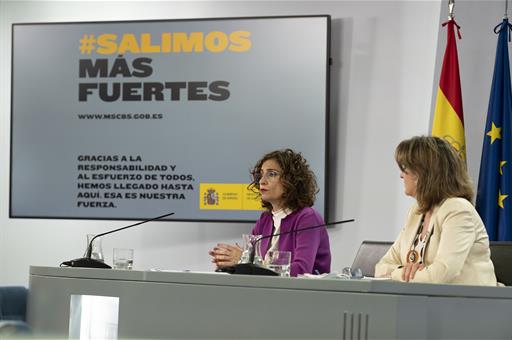Council of Ministers
Government regulates energy sector with aim of being 100% renewable by 2050
Council of Ministers - 2020.6.23
Moncloa Palace, Madrid
The Council of Ministers approved a Royal Decree-Law to boost renewable energies and convert the sector in a driver of economic and industrial recovery following the COVID-19 crisis, with the ultimate aim of Spain obtaining all its electricity from sustainable sources by the year 2050.
The Fourth Vice-President of the Government and Minister for Ecological Transition and Demographic Challenge, Teresa Ribera, argued that the impact of the measures will not just be limited to the energy sector, for example through reducing dependency on imported energy sources and savings in the electricity bill. "Renewable energies are already the cheapest source of electricity generation", she said. The minister pointed out that this will also help improve competitiveness, development and the modernisation of the industry, create sustainable and quality jobs tied to the country, and mitigate climate change.
The "green investment" argued Teresa Ribera, is one of the main priorities of the European Union and of the Government of Spain. "Spain is ready and in a position to harness this new industrial revolution".
The minister highlighted that our country is in an unbeatable position, not only due to its climate conditions - Mediterranean and Atlantic winds and a number of hours of sunshine above the global average - but also because the renewables sector is consolidated, innovative and has a great capacity to grow.
According to the figures provided by the minister, over the last 10 years, the cost of installing a photovoltaic panel has fallen in Spain by more than 80%, and consequently, the price at which the energy generated is sold has fallen by 94%. Spanish industry is already capable of producing almost all the elements of a wind turbine, 65% of the components necessary for a solar installation to operate and 90% of the capital goods necessary to digitalise the networks and guarantee the integration of renewables in the energy system as a whole.
Halt speculation, new auction system and storage
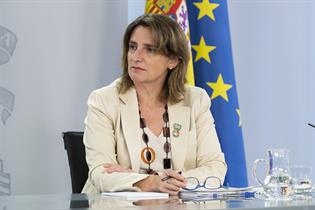 Pool Moncloa/Borja Puig de la BellacasaThe Royal Decree-Law seeks to establish a safe and modern legal framework that guarantees certainty and stability in the energy system, declared Teresa Ribera. One of its goals is to halt speculation associated with the permits to connect to the electricity networks, to which end a mandatory timeline is established with five milestones that developers must adhere to; if not, their connection permit will immediately expire.
Pool Moncloa/Borja Puig de la BellacasaThe Royal Decree-Law seeks to establish a safe and modern legal framework that guarantees certainty and stability in the energy system, declared Teresa Ribera. One of its goals is to halt speculation associated with the permits to connect to the electricity networks, to which end a mandatory timeline is established with five milestones that developers must adhere to; if not, their connection permit will immediately expire.
Furthermore, a new auction system has been designed that replaces the current one dating back to 2013, which has become obsolete. "It was conceived at that time with the idea that generating 1 kWh of renewable energy cost more than the price at which it was then sold in the market, while the current situation is exactly the opposite", explained Teresa Ribera.
The new system offers the developer a price for long-term energy that guarantees the foreseeability and stability of income for investors and allows participation under equal conditions, whatever their size. Another advantage, stated the minister, is that it will pass on to the consumer the savings stemming from the production of electricity from renewable sources.
Storage is also regulated in the new legislation, such that a plant can use the energy produced at a subsequent time, and it also incorporates the hybridisation of renewable technologies in a single location to save network costs and minimise the environmental impact.
Reduction in impact of COVID-19 on sector
Teresa Ribera acknowledged that the health crisis caused by the coronavirus has had an impact on the sector since the values of electricity market prices and CO2 emissions allowances have fluctuated.
That is why, she stated, measures have been put in place so that facilities that sign up to the specific remuneration regime where operating costs essentially depend on fuel prices (co-generators, slurry and waste operators) enjoy recalculated remuneration. Furthermore, in order to guarantee the liquidity of the electricity system, the use of surplus income will be authorised to cover potential imbalances and variations between income from the system and costs in 2019 and 2020.
Just transition and sustainable mobility
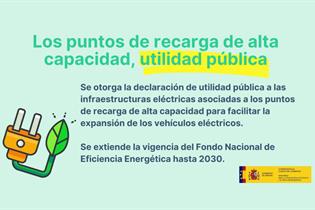 The minister advocated the need for renewable energy projects to reach those areas where coal-fired power stations that are not economically sustainable will close down, and hence actions are planned to promote this transition.
The minister advocated the need for renewable energy projects to reach those areas where coal-fired power stations that are not economically sustainable will close down, and hence actions are planned to promote this transition.
As regards sustainable mobility, the infrastructures necessary to create ultrafast charger points for electric vehicles on highways and motorways will be declared a public use.
Local authorities may use up to 100 million euros of municipal surplus funds to purchase low emissions vehicles, and the second edition of the MOVEs Plan, approved last week, will incorporate the possibility of individuals gaining access to subsidies to buy electric motorbikes.
Other environmental measures
Corporate income tax discounts for technological innovation activities at industrial automotive plants will be increased from 12% to 25% and the validity of the National Energy Efficiency Fund will be extended until 2030.
The government also authorised the Institute for Energy Diversification and Savings to call a round of proposals for the sum of 20 million euros for photovoltaic solar energy installations in the Canary Islands.
Support for LGTBI Pride 2020
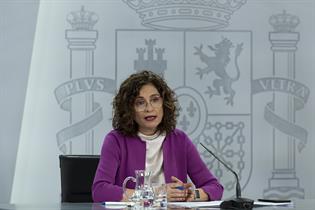 Pool Moncloa/Borja Puig de la BellacasaThe Council of Ministers approved an institutional statement on the occasion of International LGTBI Pride Day, to be held on 28 June, which undertakes to work to ensure real and effective quality for this group and ensure they are not discriminated against on grounds of sexual orientation, identity, gender expression or sexual characteristics.
Pool Moncloa/Borja Puig de la BellacasaThe Council of Ministers approved an institutional statement on the occasion of International LGTBI Pride Day, to be held on 28 June, which undertakes to work to ensure real and effective quality for this group and ensure they are not discriminated against on grounds of sexual orientation, identity, gender expression or sexual characteristics.
The Minister for the Treasury and Government Spokesperson, María Jesús Montero, recalled that the 15th anniversary of the approval of same sex marriage in Spain falls in the coming week, "a milestone that placed us as a society in a positon we can be proud of - at the head of international progress on LGTBI rights".
María Jesús Montero highlighted that Spain has always been at the vanguard of acquiring LGTBI rights which, in today's society, are unquestionable. As an example of this commitment, she said, the government declares its support for the holding of LGTBI Pride 2020, and invites people to join in these celebrations.
Mobile World Congress until 2024
The government approved a Royal Decree to extend the holding of the Mobile World Congress in Barcelona until the year 2024.
María Jesús Montero announced that the new legislation also contains an agreement with the company that organises the event - Groupe Speciale Mobile Association (GSMA) - to resolve the consequences of the cancellation of the 2020 edition due to the COVID-19 health crisis. GSMA will offer Central Government a significantly reduced rate and more beneficial conditions than in previous editions for 2021, to offset the costs it took on for the 2020 edition.
The minister underlines that the Mobile World Congress is the most important event in the world related to mobile telephony. The 2019 edition had an economic impact of 470 million euros and created 13,000 jobs.
Contribution to international funds
The government approved voluntary contributions to 32 international organisations, programmes and funds for the sum of 3,185,000 euros. Spain thus contributes to the defence and promotion of human rights, to strengthening peace and enhancing international security, to development cooperation and in the fight against terrorism.
María Jesús Montero quoted by way of example the 850,000 euros agreed for the Office of the United Nations High Commissioner for Human Rights and the 500,000 euros for the Union for the Mediterranean, coinciding with the 15th anniversary of the Barcelona Conference.
8x8 combat vehicle
The Council of Ministers authorised the "First production batch of the 8x8 Wheeled Armoured Combat Vehicle (Spanish acronym: VCR), for an estimated sum of more than 2 billion euros.
The Government Spokesperson specified that over the course of the next 10 years, the first batch of 348 units will be manufactured. The production of these VCR defence vehicles relies 70% on national production industry, hence the importance of backing this programme.
María Jesús Montero pointed out that the production of these vehicles is particularly important in Asturias, Seville, Guipúzcoa and Madrid, which expect the creation of some 650 direct jobs and 1,000 indirect jobs.
The contract will allow vehicles to be replaced that have exceeded their life cycle, such as medium-sized vehicles, thereby improving security, the capacity for self-defence and developing convergence with the goals set by NATO.
Current affairs
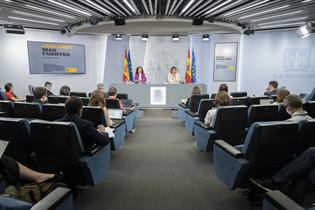 Pool Moncloa/Borja Puig de la BellacasaThe Government Spokesperson called for individual responsibility from people to follow the preventive measures established by the Ministry of Health - physical distancing, frequent hand washing and the use of face masks - and maintain permanent caution until a vaccine is discovered or an effective treatment to the virus.
Pool Moncloa/Borja Puig de la BellacasaThe Government Spokesperson called for individual responsibility from people to follow the preventive measures established by the Ministry of Health - physical distancing, frequent hand washing and the use of face masks - and maintain permanent caution until a vaccine is discovered or an effective treatment to the virus.
María Jesús Montero recalled that the pandemic is gathering force around the world, and hence we should not underestimate the virus.
Commitment from political forces
María Jesús Montero stated that the government was able to push through the successive extensions to the state of emergency, which has been the most effective and efficient instrument in keeping the virus at bay and in saving lives. However, she clarified that the government is not planning to reactivate it, or indeed studying this possibility, unless there is a drastic change in the course of the pandemic.
The minister recalled that Pedro Sánchez conveyed in an institutional statement on Saturday that the state of emergency has been one of the most difficult and complex periods in recent democratic history, which has been overcome thanks to the commitment, shared work and exemplary efforts of the whole of society.
"Our people have shown that unity allows us to be stronger and now is the time for this to flourish in politics", said the Government Spokesperson, who urged all institutions and political forces to make "unfailing contributions" to the socio-economic reconstruction of Spain, regardless of the European political party they may belong to. "We must rise above party interests and hues", she added.
European response
María Jesús Montero indicated that Spain advocated at the recent European Council meeting the need to forge alliances and agreements, and to design an ambitious, effective and speedy solution to tackle the crisis stemming from the pandemic.
The government has it quite clear, argued María Jesús Montero, that "If Europe wants to come out of this crisis socially and democratically stronger, then it cannot use the same plan as in the previous crisis". In her opinion, innovative and different solutions are required that are capable of stimulating the economy in all countries, particularly in those hardest hit by the health crisis.
Committee for Social and Economic Reconstruction
The Government Spokesperson announced that the Committee for Social and Economic Reconstruction in the Lower House of Parliament will present its first conclusions next week.María Jesús Montero thanked its members for their contributions and trusts that there will be a drawing together of positions and agreements that allow a common position to be presented to Europe.
Non official translation





